Have you ever wondered how tokenization is changing the investment landscape? Imagine a world where almost any asset, from real estate to art, can be digitally represented and divided into small parts that anyone can buy. This is not just a futuristic dream; it’s a reality that is already taking shape. In this article, we will explore the benefits of tokenization and why it is considered the future of investment.
What is Tokenization?
Tokenization is the process of converting rights to an asset into a digital token that can be stored, transferred, and traded on a blockchain. This means that instead of having to purchase an entire asset, such as a property or a piece of art, you can buy a fraction of that asset through a token.
Benefits of Tokenization
1. Accessibility
One of the biggest benefits of tokenization is that it democratizes investment. In the past, only the wealthy could invest in expensive assets like real estate or art. Now, anyone can buy a token for a fraction of the cost of the full asset. This opens the doors to a new class of investors who previously could not participate.
2. Liquidity
Liquidity refers to how easily you can buy or sell an asset without affecting its price. Tokenized assets can be traded on exchange platforms, allowing investors to sell their tokens quickly. This is especially useful for assets that traditionally have low liquidity, such as properties or investments in startups.
3. Diversification
With tokenization, you can diversify your investment portfolio in a way that was previously difficult. Instead of investing large sums in a single asset, you can purchase multiple tokens representing different assets. This reduces risk, as your investment is not dependent on one single asset.
4. Transparency and Security
Blockchain technology provides a high level of transparency and security. All transactions are recorded and can be audited, reducing the risk of fraud. Additionally, the use of smart contracts ensures that the terms of the investment are automatically fulfilled, adding an extra layer of trust.
5. Lower Transaction Costs
Tokenization can reduce the costs associated with buying and selling assets. Instead of paying high fees to intermediaries, such as real estate agents or brokers, investors can conduct direct transactions on the blockchain. This not only saves money but also streamlines the process.
6. Innovation in Investment
Tokenization is driving innovation in the investment sector. New business models are emerging thanks to the ability to create and trade tokens. For example, some platforms allow artists to tokenize their works and sell them directly to their fans, creating new revenue opportunities.
How Does Tokenization Work?
Tokenization Process
1. Asset Selection: The first step is to choose the asset to be tokenized. This can be a physical good, such as a property, or a digital asset, such as a piece of art.
2. Token Creation: A digital token representing the asset is created. This token contains information about the asset and its ownership rights.
3. Blockchain Registration: The token is registered on a blockchain, ensuring its authenticity and allowing for tracking.
4. Trading: Once created, the token can be traded on exchange platforms, allowing investors to buy and sell.
The Future of Tokenization
Technological Innovations
Tokenization is constantly evolving. New technologies, such as artificial intelligence and data analytics, are beginning to integrate into the tokenization process, potentially improving the accuracy of asset valuation and facilitating investment decision-making.
Regulation and Compliance
As tokenization gains popularity, the need for regulation also increases. Regulatory bodies are starting to establish frameworks that will ensure that tokenization is safe and fair for all investors. This is crucial for fostering trust in this new investment model.
Challenges of Tokenization
Regulation
While regulation can be beneficial, it also presents challenges. Different jurisdictions may have varying laws, complicating the tokenization process. It's important to stay informed about local and global regulations.
Market Adoption
Widespread acceptance of tokenization is still in its early stages. Some investors may be hesitant to adopt new technologies. Education and promotion will be key to overcoming this obstacle.
Conclusion
Tokenization offers a range of benefits that are transforming the world of investment. From accessibility and liquidity to transparency and reduced costs, the opportunities are vast. However, it is also crucial to be aware of the challenges it presents.
With a promising future, tokenization is not only revolutionizing how we invest but also creating a more inclusive and efficient ecosystem. If you’re ready to explore the future of investment, tokenization could be your gateway to a world of opportunities.
Are you prepared to take the leap into tokenization? The future of investment is here!
